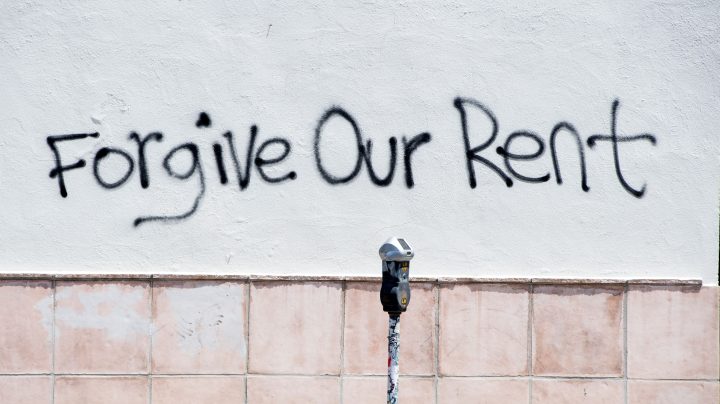
Is it OK not to pay rent during the COVID-19 pandemic?

The coronavirus, resulting stay-at-home orders and record job losses are having an impact on some people’s ability to pay rent. According to Apartment List, 31% of Americans made a partial rent payment or no payment at all in May. That’s up from 25% in April, but the majority of those missed payments were eventually made up.
Figures from the National Multifamily Housing Council are slightly better. They show only 20% of renters have yet to make any payment for May. That’s down only 1.5 percentage points from this time last year, but the council says it’s reflective of the fact that it represents professionally managed buildings that tend to have more affluent tenants, and some landlords have worked out payment plans.
Things could still get worse. A recent Marketplace-Edison Research Poll found 62% of renters are worried about being able to pay.
“With this number of unemployed, and the economy at a standstill right now, I just can’t see this trend continuing,” said Doug Bibby, president of the National Multifamily Housing Council.
Many people and families who have lost income because of the pandemic are facing the question: Should I pay rent? And could I be evicted from my house or apartment if I don’t?
Protections for renters vary by state and city. In New York, for example, Gov. Andrew Cuomo said this week that nobody in the state can be evicted for not paying rent due to the coronavirus until Aug. 20. In a tweet, he said “New York State will extend the moratorium on evictions for those facing COVID-related hardship for an additional 60 days.”
New York state has also banned late fees and missed payment fees, and is allowing renters who are facing COVID-19-related hardships to use their security deposits as payment and to repay it over time.
The Eviction Lab at Princeton University, with Emily Benfer at Columbia Law School, has created a policy scorecard for each state. Twenty-three states received less than one star out of five. Benfer, who studies health equity and social justice, said those states are home to 31 million renters.
There are nine states, including Missouri and Idaho, where renters are not protected by statewide eviction moratoriums. Some cities within those states, like St. Louis, have passed local protections.
There is nationwide protection for people living in federaly subsidized housing. They are covered under a moratorium until July 25, and after that day, landlords have to give tenants 30 days’ notice. But it can be difficult for renters to know if their building qualifies, for instance, because the landlord has a federally backed mortgage.
Even if a renter is protected by a moratorium on evictions, what happens once the moratorium ends?
“The moment these are lifted, we will see mass numbers of filings for evictions,” Benfer said.
The stay orders are really just stopgap measures, she said. They’re designed to keep people housed during the public health crisis, and so that they can comply with local stay-at-home orders. They will not give longer-term protection to people who have lost their jobs or other income.
Benfer said renters should contact their local legal aid office to ask for specific advice and check their state, county and city websites. At some point, they will need to agree with their landlord on how to catch up on past rent.
“The key thing for renters is that if you can’t pay your rent, or you can’t pay your full rent, you should contact your landlord,” said Shamus Roller, executive director of the National Housing Law Project. Let them know your situation and talk about reduced rent, a payment plan or a payment holiday. Most landlords want to know what’s going on with their renters, he said.
Rent activists have joined together in calls for a nationwide rent strike, and asked even those who can afford to pay to withhold May’s rent. They are calling for rents to be canceled until people can safely go back to work.
Benfer warns that if people can’t or don’t pay, the effects will quickly be felt more widely.
“We will see a direct impact on national and local economies,” she said.
Landlords will stop paying their maintenance and other workers. They may miss payments on their property tax, which funds local services. They may default on mortgages. That will affect the entire country’s recovery from the coronavirus pandemic.
“If people are not safely housed, we will not recover as a nation,” Benfer said.
There’s a lot happening in the world. Through it all, Marketplace is here for you.
You rely on Marketplace to break down the world’s events and tell you how it affects you in a fact-based, approachable way. We rely on your financial support to keep making that possible.
Your donation today powers the independent journalism that you rely on. For just $5/month, you can help sustain Marketplace so we can keep reporting on the things that matter to you.

















